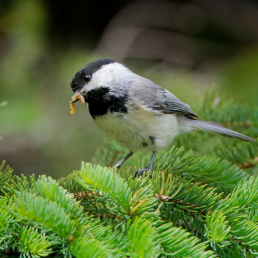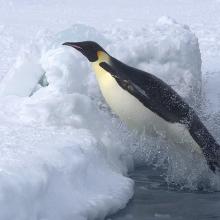

Join BirdNote tomorrow, November 30th!
Illustrator David Sibley and actor H. Jon Benjamin will face off in the bird illustration battle of the century during BirdNote's Year-end Celebration and Auction!
The Emperor Penguin is the largest penguin on the planet. It’s also the deepest and longest underwater diver. Biologist Jessica Meir, pictured here, traveled to Antarctica to study their amazing feats. She learned that Emperor Penguins can hold relatively more oxygen in their bodies than humans or other terrestrial animals, and they use that oxygen with incredible efficiency. If we can understand how the penguins tolerate such low levels of oxygen, we may someday apply that information to medical care for humans.
Support for BirdNote comes from the Port Aransas Tourism Bureau. Info on February's Whooping Crane Festival and hundreds of species of birds to see year-round at VisitPortAransas.com.
BirdNote®
Deep-diving Emperor Penguins
Featuring Jessica Meir, Ph.D.
Interview and story by Eileen Bolinsky
This is BirdNote.
The Emperor Penguin. [Trumpeting call of Emperor Penguins + underwater sounds]
The deepest dive ever recorded for an Emperor Penguin is 564 meters [more than a third of a mile]. The record duration is 27 minutes on a single breath.
Biologist Jessica Meir [MEER] traveled to Antarctica to study how they achieve these feats. She learned they can hold relatively more oxygen in their bodies than humans or other terrestrial animals, and they use that oxygen with incredible efficiency. Here’s Jessica:
“If you look at something as simple as heart rate you can start understanding a lot about what's going on with that animals’ physiology and oxygen usage during the dive.”
Meir and her colleagues fitted Emperor Penguins with backpack recorders to measure their heart rate. At rest, the rate is about 70 beats per minute, similar to a human. But before and after plunging into icy water, it increases significantly, ramping up to effectively load oxygen. Then, when diving, the heart rate also takes a dramatic dive.
“So in a long dive//which was about 18 minutes, we had a heart rate down to three beats per minute and then around six beats per minute for a sustained five minute period. So very, very impressive.”
You can find links to Meir’s work at birdnote.org.
Support for BirdNote comes from the Port Aransas Tourism Bureau. Info on February's Whooping Crane Festival and hundreds of species of birds to see year-round at VisitPortAransas.com.
###
Trumpeting call of Emperor Penguin from Anthony Powell https://www.youtube.com/watch?v=CBpX5UWR9uA
Underwater using hydrophone, recorded by Gordon Hempton of QuietPlanet.com.
BirdNote’s theme music was composed and played by Nancy Rumbel and John Kessler.
Producer: John Kessler
Executive Producer: Chris Peterson
© 2015 Tune In to Nature.org October 2018 Narrator: Michael Stein Interview recorded at LOE studios
ID# EMPE-01-2013-08-08EMPE-01








